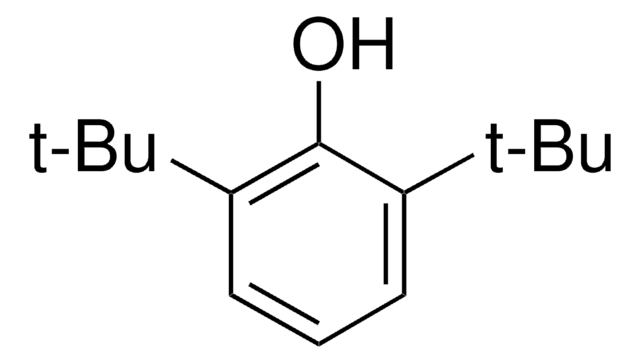137731
2,4-Di-tert-butylphenol
99%
Synonym(s):
2,4-Bis(1,1-dimethylethyl)phenol, 2,4-Bis(tert-butyl)phenol, 2,4-Di-tert-butylhydroxybenzene, 2,4-Ditert-butylphenol
About This Item
Recommended Products
vapor pressure
1 mmHg ( 84.5 °C)
Quality Level
Assay
99%
form
solid
bp
265 °C (lit.)
mp
53-56 °C (lit.)
solubility
water: soluble 0.033 g/L at 25 °C
SMILES string
CC(C)(C)c1ccc(O)c(c1)C(C)(C)C
InChI
1S/C14H22O/c1-13(2,3)10-7-8-12(15)11(9-10)14(4,5)6/h7-9,15H,1-6H3
InChI key
ICKWICRCANNIBI-UHFFFAOYSA-N
Gene Information
human ... GABRA1(2554)
Looking for similar products? Visit Product Comparison Guide
Related Categories
General description
Application
Signal Word
Danger
Hazard Statements
Precautionary Statements
Hazard Classifications
Aquatic Acute 1 - Aquatic Chronic 1 - Eye Dam. 1 - Skin Irrit. 2
Storage Class Code
8A - Combustible corrosive hazardous materials
WGK
WGK 2
Flash Point(F)
239.0 °F - closed cup
Flash Point(C)
115 °C - closed cup
Personal Protective Equipment
Choose from one of the most recent versions:
Already Own This Product?
Find documentation for the products that you have recently purchased in the Document Library.
Our team of scientists has experience in all areas of research including Life Science, Material Science, Chemical Synthesis, Chromatography, Analytical and many others.
Contact Technical Service



![7,9-Di-tert-butyl-1-oxaspiro[4.5]deca-6,9-diene-2,8-dione certified reference material, TraceCERT®, Manufactured by: Sigma-Aldrich Production GmbH, Switzerland](/deepweb/assets/sigmaaldrich/product/structures/294/930/cd996125-79d8-4b2f-885c-f43d19084fc0/640/cd996125-79d8-4b2f-885c-f43d19084fc0.png)






